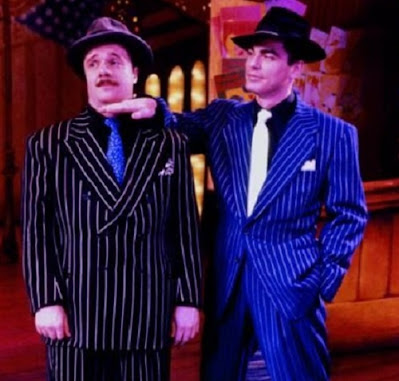July 21, 2022
Posted by Jay Livingston
I saw on a local news site that Nathan Lane is moving into the Dorilton, an elegant building on New York’s Upper West Side just a few blocks from where I live. Lane and his husband are paying $4.1 million for the seven-room apartment.
I have been inside the Dorilton only once, and it was the site of one of the more embarrassing moments in my life.
In May of 1992, my son was invited to a birthday party for twins who were turning two. They were a half year older. We knew them and their parents from the nearby playgrounds, mostly the Elephant Playground in Riverside Park but in cold weather an indoor playground, a large open space on the upper floor of a church. The family had an apartment in the Dorilton. There were only two apartments on that wing of the building. When you got off the elevator, if you turned right, you were in their apartment; if you turned left, you were in the other.
I knew some of the other people at the party — playground parents — but certainly not all. At one point, I was passing through the foyer, and I came face to face with a man who I was sure I had seen before — good looking, dark hair, 35-40. “You look familiar,” I said. “Do I know you maybe from the playground?” I thought he might have been an uncle who sometimes took the twins.
“No,” he siad, “I just live across the hall.”
“But I think I’ve seen you someplace,” I said.
“Well, I’m an actor, so maybe that’s it.”
Maybe so, but where had I seen him? On TV? A commercial? New York is full of actors, and most of them are, to put it euphemistically, between roles — waiting tables and going to auditions. So not wanting to embarrass him, I asked as tactfully as I could what he was doing these days.
“I’m in the new production of ‘Guys and Dolls’”
I was too embarrassed to admit that I knew nothing about this production — the staging, the stars, etc. — except that it had opened just a few weeks before to rave reviews. I guess this guy had gotten lucky and landed a part. I didn’t want to reveal my ignorance, but I did know the show pretty well, so I asked, “What role do you have?”
“I’m Sky Masterson.”
Oh my god. He was the star of the show – well, one of the four stars. Peter Gallagher, and he looked familiar because two or three years earlier, I had seen him in the movie “Sex, Lies, and Videotape,” where he played one of the four main characters. I said something and slinked away. OK, it probably didn’t look like slinking. It looked like moving on, mixing, coffee in hand. But it felt like slinking. In the same way, the questions I’d asked him proabably didn’t seem offensive or denigrating to him, but in my mind, I knew that I was treating a Broadway star as though he were merely one of the thousands of unsuccessful hopefuls.
Eventually, the Gallagher family moved out of the Dorilton and went back to Los Angeles. But here is where we come full circle. The other important male character in “Guys and Dolls” is Nathan Detroit, and in that 1992 production, the part was played by Nathan Lane.
--------------------
1. Here is the sociology I cropped out of the above narrative and have relegated to this long footnote:
Why was that incident embarrassing?
Embarrassment, says Goffman in his famous essay on the topic, is about identity. “Identity” may be too grand a term here – “being a certain kind of person” would do — but “identity” is the term Goffman uses.
In a social situation, people must act in accordance with the identity they claim so that others will ratify that identity. If there’s a glitch on either side, you get embarrassment. Often, embarrassment disrupts a situation when a person does something that casts doubt on their “projected identity.” It’s hard to project an identity as a person who knows the norms of dress and decorum if you’re standing there with your fly not zipped.
But embarrassment also happens when we unwittingly fail to acknowledge or ratify someone else’s identity. This includes mistaken identity, like greeting someone warmly who turns out to be a total stranger, or making a remark to the “wrong” person. It also includes not knowing the relevant aspects about the other person’s identity, like the fact that they are the star of the biggest Broadway hit of the season.
2. Peter Gallagher made an appearance in this blog a few years ago (here) in a post with a video of him making the cast recording of the show.
3. The title of this post alludes to the Hulu TV series “Only Murders in the Building.” Nathan Lane will be a regular in the cast next season. The fictional building in that show is The Arconia. In real life, across Broadway from the Dorilton and two blocks north is a building called The Ansonia. It appears in several Hollywood films. Walter Matthau lives there in “The Sunshine Boys” as do Jennifer Jason Leigh and Bridget Fonda in “Single White Female.” In real life, I live there.

